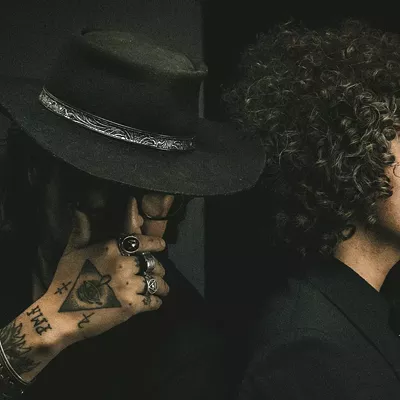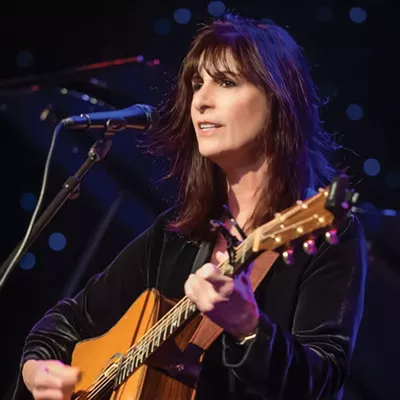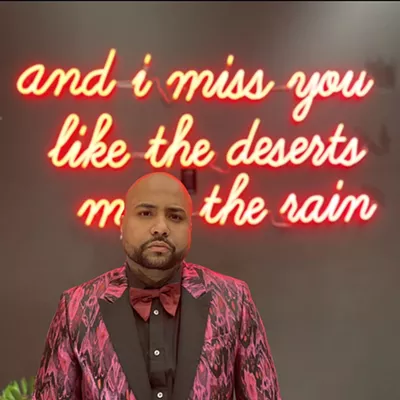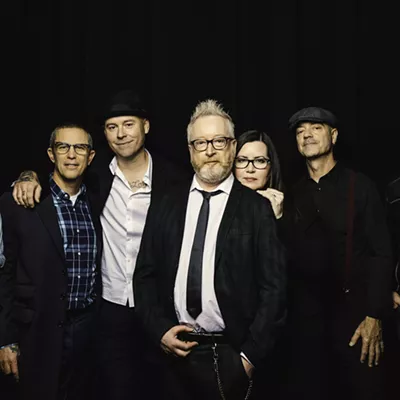When the Ramones played their first British show, on July 4, 1976, it was exactly what a generation of pissed-off youths—facing racial tensions and skyrocketing unemployment—was looking for.
But three years later, things had cooled off a bit. The mostly white punks and the mostly black reggae fans realized, as they found themselves in the same unemployment lines, that they might have more in common than they initially realized: They were all just poor kids looking for jobs and a better life. If there was no panacea, there was at least escape through, among other things, music.
It was in this climate that the punks and reggae fans of the Midlands area of England started gathering together at house parties—"punky reggae parties"—in which there was a DJ in one corner of the room spinning dub reggae 12-inches, and another in the opposite corner playing the punk singles of the day.
Dave Wakeling explains, "If we played all punk singles, the floor would be crowded and crazy for about an hour, and then everybody would disappear. And if you played all reggae, you'd end up with everybody lined up, leaning against the wall, nodding. So if you had one of that, one of this, two of this, two of the other, we found it was the most fantastic blend, and the dance floor stayed packed. The energy from the punk lifted them up, and the sensuality and the groove of the reggae settled 'em down."
Many of the kids who attended those parties soaked it all in and ended up forming a handful of bands that blended it all together—bands like the Specials, Madness, the Selecter, Bad Manners, and the Beat. They emerged with a new sound that would be called 2 Tone.
The 2 Tone bands combined reggae and ska, punk and soul; added lyrics that often addressed the issues of the day; and placed an emphasis on inclusion. "It was a perfect storm of conditions and climates, really," recalls Wakeling, who sang lead vocals for the Beat—or, as they were known in America, the English Beat. "Because punk had just destroyed so many rules and regulations, you found yourself in the vacuum that followed, with quite a lot of relative freedom. And so you could get dance-y tunes together, and pair them up with what you might call more social (awareness)—so long as it was catchy, no one seemed to notice."
Not only was the English Beat catchy; it was arguably the smoothest of all the 2 Tone bands, a trait largely attributed to Wakeling's soulful croon of a voice, which he says came from a love of Motown. Wakeling's voice was offset perfectly by fellow vocalist Ranking Roger, who, when he wasn't taking lead vocals on a particular song, served as the equivalent of the hype-man in hip-hop.
The original Beat lasted only four years, releasing three excellent albums: 1980's I Just Can't Stop It; Wha'ppen? from 1981; and 1982's Special Beat Service, all on I.R.S. Records.
They were instant superstars in the United Kingdom, but, like most bands pushing boundaries at the time, managed to become only college darlings in America. I.R.S. promoted them as such, placing them on tours with slightly more popular fellow-undergrounders like Talking Heads, the Clash, and the Police. After touring to promote Special Beat Service, two of the band's members, guitarist Andy Cox and bassist David Steele, wanted time off—something the other members didn't.
The English Beat broke up soon thereafter, with Wakeling and Roger immediately forming General Public, which scored a pair of hits, "Tenderness" and a cover of "I'll Take You There," in the United States. After taking a couple of years off, Cox and Steele emerged with a new band, Fine Young Cannibals, who hit it big with a couple of singles, most notably "She Drives Me Crazy."
After two albums with General Public, Wakeling left to pursue a lifelong dream of working for Greenpeace. A General Public reunion album came later, and eventually, Wakeling, who has lived in California for the last 23 years, started playing in a succession of bands in the States. Eventually, one of those bands morphed into an all-new version of the English Beat. (At one point, VH1's Bands Reunited series attempted to reunite all of the band's original members, but Cox and Steele wouldn't participate.)
The English Beat may have become a beloved footnote in the history of college music if a funny thing hadn't happened in the United States in the '90s: An entirely new generation of kids became enamored with the 2 Tone sound and started forming bands of their own. "Third-wave" ska bands such as No Doubt and the Mighty Mighty Bosstones started mentioning that the English Beat had influenced them, and fans of those bands began taking interest.
But Wakeling is quick to point out that, just as the 2 Tone bands weren't merely mimicking early Jamaican ska bands, similarly, the third-wave bands weren't just mimicking the 2 Tone bands.
"I suppose like any blended wine that's got different grapes in it, it's got its certain percentages," he says. "So the percentage of punk, soul, reggae and ska in 2 Tone was slightly different, I think, from the blend that the third-wave years later, here in America, came up with, which (tended) to add yet another dose of punk to it, so it got faster again."
In the mid '90s, one of the third-wave bands, Reel Big Fish, invited Wakeling to perform at their first album-release party. He obliged, and they've remained friends, leading to the current tour.
And following in that tradition of evolving the sound, Wakeling says the new Beat isn't quite the same as the old Beat.
"In the same way as when we started in 1979, I didn't want us to sound like we were from Kingston, Jamaica, in 1963; and now I don't want to sound like I'm from the Midlands of England in 1979, you know," Wakeling explains. "There are three Englishmen and four Americans in the band, and most everybody lives in California ... and so I'm happy to have a kind of Amer-reggae flavor on it, which is like reggae but with an extra dose of soul in the drums. This is my new cause—the establishment and development of Amer-reggae."







